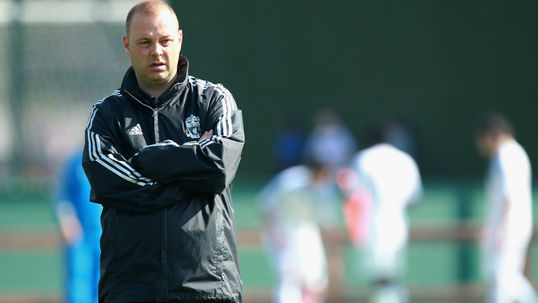Meeting Messi's first coach
Posted Tuesday, December 18, 2012 by ESPN

ESPNSTAR.com catches up with Rodolfo Borrell, Lionel Messi's first coach at Barcelona and the current director of Liverpool's youth academy.
Liverpool's Under-19 squad travelled to Singapore over the weekend for the NexLions Cup, a youth football tournament where they faced off against Manchester United Under-19, Sporting Lisbon Under-19 and a Singapore Youth Selection.
It was at an open press conference where I serendipitously bumped into Borrell and found out that he was Messi's first coach when the Argentine joined Barcelona more than a decade ago.
While most of the press were conducting interviews with Liverpool's Under-19 captain Adam Morgan, Manchester United's academy director Brian McClair and Singapore coach Aide Iskandar, it was in a quiet corner of the room where Borrell proudly took out his phone and showed me the team picture of the Barcelona youth team from a decade ago which featured Messi, Cesc Fabregas and Gerard Pique.
Borrell, who has two decades of coaching under his belt, joined Liverpool's youth academy in 2009 under Rafa Benitez has recently been promoted as head of the club's academy.
Under his charge, the Liverpool academy, which has previously failed to provide the senior side with a notable player since Steven Gerrard in 1998, has seen youngsters like Raheem Sterling, Andre Wisdom, Jon Flanagan, Jack Robinson, Adam Morgan and Conor Coady make their mark in the first team.
Here, Borrell talks about Liverpool, youth philosophy and of course, his former protégé Messi.
You were brought over to Liverpool after spending 13 years coaching at Barcelona's La Masia academy - was it specifically to bring the 'Barcelona' style to the club?
I always say that you never have to go another club and say everything is wrong and bring everything new - because it's not right. I think l bring experience attributes and characteristics and it's just a matter of implementing methods which make them improve.
So, no, it was not to copy Barcelona. That's a little silly, in my opinion. I'm here simply to make the youth system and its players better.
Would you say that there will be more focus on a passing-based game in the club?
Liverpool have always been well-known for their passing game, and in order to keep the tradition or even to enhance it, yes
You must be happy to have had a few players from the youth squad making it into the first team.
Yes, the first thing that is important is that all the squads through the youth system are playing with the same style, have the same kind of play and the same ideas; this makes it easier for the players to go through the ranks.
The first team manager also plays an important part. You can have good players but if the first team manager does not like to work with young players, it will be difficult [to get them in the first team].
Fortunately for us, we have a good young manager who believes in young talent, especially ours. He's giving them a chance, and they're making use of the chance.
How would you describe the 'style' that Liverpool play throughout the ranks which you mentioned earlier?
I would say it's attack-minded. We try to trade the ball well, play from the back and try to beat opponents by combination play.
That's not easy in England because the game is very physical but we've played this way for three and half years in the youth system and the first team.
We're starting to see the results now with players making the mark in the first team and they're getting more and more chances each time and this is very important for the club as a whole.
How often does Brendan Rodgers communicate with the youth sides - both the coaches and the players?
It's a constant communication flow. Day-in, day-out, we talk about the players - how they are performing, how they are doing.
Sometimes, the players are required to train at Melwood [Liverpool's training ground], with the first team, where he coaches them.
In a youth tournament like the NexLions Cup, what are your priorities? Winning? Or developing your side?
To develop players. We want to make them grow and ready them for the occasion when they are asked to perform. Of course, we also want to develop the winning mentality with the players, especially at such a demanding club.
But winning is not the main priority - if we did the right things, we will have more chances to win. If we get the right balance and play to win, everything will go right for us.
Of the youth teams here, which one impresses you the most?
Sporting Lisbon might not be known as much Liverpool or Manchester United, but they have a tough side.
I come from Barcelona, which is close to Portugal and I know their history very well and they have a very good youth side.
They have magnificent players, very good communication, excellent technique and are a very good side to watch.
They may not be as well-known on the first-team level as they are more of a selling club traditionally but they have produced some fantastic players. For example, Cristiano Ronaldo, Luis Figo, Paulo Futre, Simao Sabrosa and many more - all very skilful and with fantastic technique.
Talking about Barcelona, what was Messi like when he first joined Barcelona at 14 years old? Was he still scoring goals for fun?
Yeah. I had the pleasure to be his first coach at Barcelona when he arrived in the 2000/2001 season, where I was the Under-14 coach at the club.
I have to say that he was already magnificent back then. He is a player who is born to play this sport.
We always say that we can improve a player, from a technical side, in terms of discipline. Right now, I wish I can sit down here that I helped Messi become this good but this was not how it is - he was born to play football.
The club makes him better in some ways, but as soon as he arrived from Argentina, he showed great talent like today.
What do you think makes him so good?
Everyone talks about Messi's technique, which is phenomenal, but I would say his mentality is outstanding.
I never saw a player with such a hunger, at the end of the training session for getting into the next day and play some more ball. It's his hunger, his mentality combined with his talent which makes him the best player in the world.
Messi said in a recent interview with El Pais that he 'never passed the ball' when he first joined the club. Was this true?
Well, it's partly true, but he's got such talent and it's very easy for him to go past opponents by dribbling. But I never thought he was a selfish player. In his forward position, you can beat a lot more players by dribbling.
He may have improved his passing game at Barcelona, but I never thought he was a selfish player.
There was another quote in an interview saying that he was extremely shy when he first joined and hardly spoke of the pitch.
[Smiles wistfully] Yes, Messi was very shy and hardly spoke when he didn't need to.
That doesn't mean that he was hard to train. Messi came from Argentina and spoke Spanish, so there were no language problems. He also got things very fast, [he is a] very sharp learner.
You have trained Pique and Fabregas in the same team as Messi's?
I had them for a few years from when they were in the Under-12s squad and continued training them when I was promoted to take charge of the Under-14s, which was when Messi joined in.
It was a magnificent squad.
Was that the best youth squad you have ever trained?
Yes, they were definitely something special.
I don't think I will have a squad like this ever again.
We are talking about going three seasons without losing, winning the league seven weeks before end of the season, and I remember winning one game 25-0.
Thank you for your time coach, it has been a pleasure.
You're welcome.
Photos
More»Wanda Nara suffers wardrobe malfunction in see-through top
Saturday May 04 2024Sky Sports presenter stuns in bold see-through outfit
Saturday May 04 2024Ex-Wag whose football partner posted naked picture of her
Friday May 03 2024



Your Say